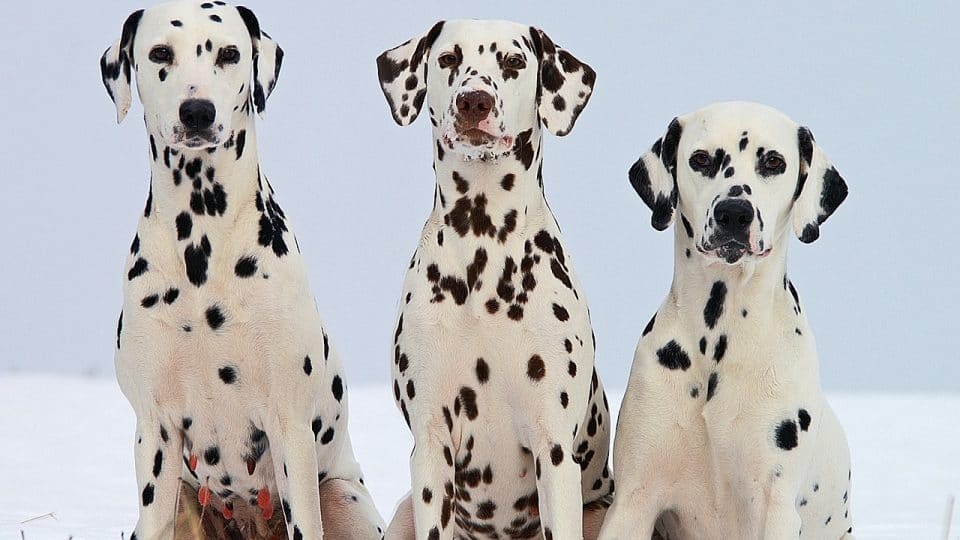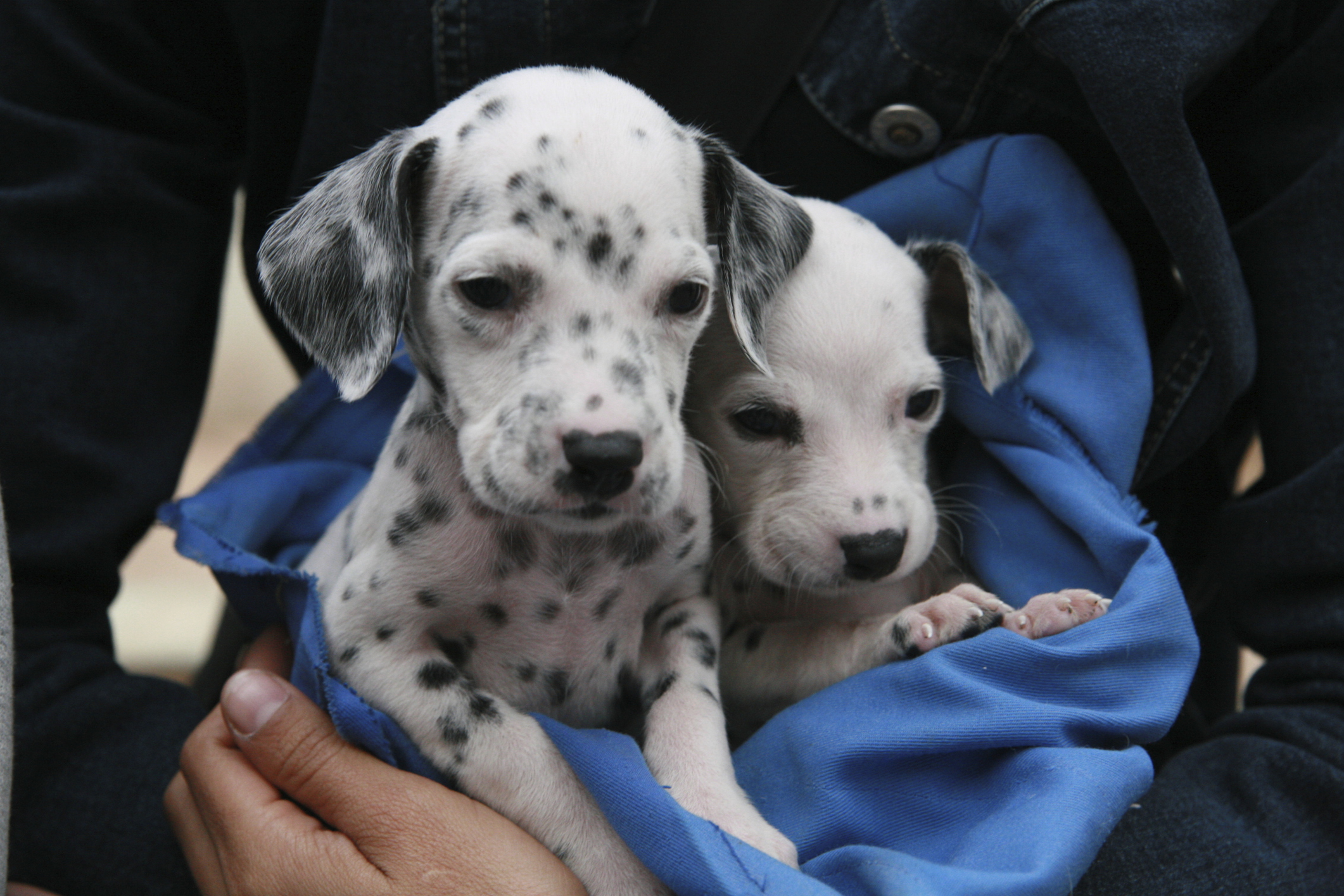Did you know that dalmatian puppies are known for their high energy levels and mischievous behavior? These spotted bundles of joy are always on the move, exploring their surroundings with boundless enthusiasm. From playing fetch to chasing their own tails, dalmatian puppies are a whirlwind of activity that can keep you on your toes!
Dalmatian puppies have a rich history as working dogs, known for their role as firehouse mascots and carriage dogs. This background influences their behavior, as they are naturally alert and protective. However, even though they have a reputation for being energetic, dalmatian puppies are also incredibly affectionate and loyal towards their owners. It’s important to provide them with plenty of mental and physical stimulation to keep their active minds and bodies satisfied. So, whether it’s long walks, interactive toys, or engaging training sessions, a well-rounded approach is key to ensuring these adorable puppies act in a happy and balanced manner.

How Do Dalmatian Puppies Act?
Dalmatian puppies are known for their distinctive spotted coats and playful personalities. If you’re considering bringing a Dalmatian puppy into your home, it’s important to understand their behavior and how they act. In this article, we will explore the typical characteristics and behaviors of Dalmatian puppies to help you better understand and care for these energetic and unique dogs.
Dalmatian Puppies and Their Energetic Nature
Dalmatian puppies are full of energy and love to play. They have a natural curiosity and are always on the go, exploring their surroundings. Due to their high energy levels, Dalmatian puppies require plenty of physical and mental stimulation to keep them happy and prevent boredom. Daily walks, playtime, and engaging toys are essential to channeling their energy in a positive way.
It’s important to note that Dalmatian puppies may become anxious or develop destructive behaviors if they don’t receive enough exercise and mental stimulation. They thrive when they have a routine and are kept busy with activities that challenge their minds. Puzzle toys, training sessions, and interactive play are great ways to keep their minds stimulated and tire them out. Providing an outlet for their energy will help maintain a well-behaved and happy Dalmatian puppy.
The Benefits of Regular Exercise for Dalmatian Puppies
Regular exercise is not only crucial for a Dalmatian puppy’s physical health but also important for their mental well-being. Physical activity helps prevent obesity, which is a common health issue in Dalmatians. Running, playing fetch, and participating in dog sports like agility or obedience can provide the necessary exercise for these active puppies.
Exercise also helps burn excess energy and reduces the likelihood of destructive behaviors caused by boredom. It promotes good muscle development, strengthens their joints, and improves cardiovascular health. Additionally, regular exercise allows Dalmatian puppies to socialize with other dogs and humans, reinforcing positive behaviors and helping them become well-rounded companions.
Dalmatian Puppies and Their Social Nature
Dalmatian puppies are inherently social animals and thrive on human companionship. They are generally friendly and affectionate towards their family members and enjoy being included in all the family activities. Dalmatians are known to be good with children, although supervision is recommended, especially with younger children who may not understand the dog’s boundaries.
Proper socialization is crucial for Dalmatian puppies to grow into well-behaved and balanced dogs. Early exposure to different environments, people, and animals helps them develop confidence and adaptability. Positive experiences during the socialization period will shape their behavior and enable them to interact politely with strangers, other dogs, and various situations throughout their lives.
Tips for Socializing Dalmatian Puppies
To ensure proper socialization, introduce your Dalmatian puppy to new experiences gradually and in a positive manner. Enroll them in puppy training classes where they can learn basic obedience commands and interact with other puppies. Take them to puppy parties or playdates to expose them to different dogs and people in a controlled environment.
Expose them to various sounds, sights, and situations that they may encounter in everyday life. This might include car rides, visits to the veterinarian, trips to the park, or encounters with people of different ages and ethnicities. The more varied experiences they have during their early months, the more well-rounded and confident they will become.
Dalmatians and Their Independent Nature
Dalmatians have a reputation for being independent and strong-willed, which can present training challenges. While they are intelligent and capable of learning, Dalmatian puppies may exhibit stubborn behavior at times. Positive reinforcement training methods work best with these dogs, as they respond well to rewards and praise.
Consistency and patience are key when training a Dalmatian puppy. Use positive reinforcement techniques like treats, verbal praise, and toys to motivate and reward desired behaviors. Avoid harsh or punitive methods, as they can lead to fear or aggression. Understand that Dalmatians have their own unique personalities, and some puppies may be more headstrong than others. Tailor your training approach to suit the individual temperament of your Dalmatian puppy.
Tips for Training Dalmatian Puppies
To effectively train a Dalmatian puppy, establish yourself as a calm and confident leader. Set clear boundaries and consistent rules from the beginning. Use repetition and short training sessions to keep their attention and prevent boredom. Dalmatians thrive on mental stimulation, so consider incorporating puzzle toys or interactive games into their training routine.
Socialization should go hand in hand with training. Expose your Dalmatian puppy to various people, animals, and environments so they become well-adjusted and comfortable in different situations. Early obedience training classes can be particularly beneficial in teaching them basic commands and canine manners.
#Benefits of Owning a Dalmatian Puppy
1. Active Companion: Dalmatians are known for their high energy levels, making them excellent companions for active individuals or families who enjoy outdoor activities and exercise.
2. Unique Appearance: Dalmatian puppies have a striking appearance with their iconic spots, making them stand out from other dog breeds. They are often considered one of the most visually appealing breeds.
3. Good with Children: Dalmatians are generally good with children and can form strong bonds with them. However, supervision is essential to ensure the interactions are safe and appropriate.
4. Intelligent and Trainable: While they can be stubborn at times, Dalmatians are intelligent dogs that can excel in obedience training with the right approach. They enjoy mental challenges and learning new tasks.
5. Social Animals: Dalmatians thrive on human companionship and enjoy being included in family activities. They can form strong bonds with their owners and are eager to please.
6. Protective Nature: Dalmatians have a natural instinct to protect their family members and their territory. They can be excellent watchdogs and deter potential intruders.
7. Healthy Breed: Dalmatians are generally a healthy breed with a long lifespan. However, it’s important to be aware of potential health issues such as deafness and urinary stones, which can be common in the breed.
#Conclusion
Understanding how Dalmatian puppies act is essential for providing them with the right care, training, and socialization. They are energetic, social, and independent dogs that require plenty of exercise, mental stimulation, and positive reinforcement training. By catering to their unique needs and characteristics, you can ensure that your Dalmatian puppy grows into a happy and well-behaved adult dog. Remember to establish yourself as a calm and confident leader and provide them with a structured routine and plenty of love and attention. With proper care and training, your Dalmatian puppy will become a cherished member of your family.
How Do Dalmatian Puppies Act?
- Dalmatian puppies are known to be energetic and playful.
- They are intelligent and eager to learn new things.
- Dalmatian puppies can be stubborn at times and may require patience during training.
- They are social animals and enjoy being around people and other pets.
- Dalmatian puppies may have a tendency to chew on things, so providing appropriate chew toys is important.
Frequently Asked Questions
Dalmatian puppies are known for their unique appearance and playful nature. If you’re curious about how these adorable puppies behave, we’ve got you covered. Here are some common questions about how dalmatian puppies act:
1. What are the typical characteristics of dalmatian puppies?
Dalmatian puppies are energetic and curious. They love to explore their surroundings and are always up for a game. They are known for their friendly nature and are often great with kids. Dalmatians are also intelligent and can be quite independent, which means they may require patient and consistent training.
These puppies are known for their high energy levels, so it’s important to provide them with plenty of exercise and mental stimulation. They may be prone to mischief if not given enough outlets for their energy.
2. Do dalmatian puppies get along well with other pets?
Yes, dalmatian puppies can generally get along well with other pets, but early socialization is crucial. If they are introduced to other animals from a young age, they are more likely to develop positive relationships with them. Supervised interactions and gradual introductions can help ensure harmony between your dalmatian puppy and other animals in your household.
Remember that each dog is unique, so it’s important to monitor their behavior and intervene if any signs of aggression or discomfort arise. Good socialization and positive reinforcement can go a long way in fostering peaceful relationships with other pets.
3. Are dalmatian puppies good with children?
Yes! Dalmatian puppies often have a natural affinity for children. They are usually patient and tolerant, making them great playmates for kids. However, it’s important to supervise interactions between young children and puppies to prevent accidental harm, as puppies can get overly excited during playtime.
Teaching children how to interact gently and respectfully with the puppy, such as not pulling their ears or tail, is essential. Additionally, always supervise any playtime between your puppy and children to ensure everyone remains safe and happy.
4. How should I train my dalmatian puppy?
Training a dalmatian puppy requires consistency, patience, and positive reinforcement. Start training early and focus on basic obedience commands like sit, stay, and come. Use rewards such as treats or praise to motivate and reinforce good behavior.
Avoid harsh or punitive training methods as dalmatians respond much better to positive reinforcement. It’s also important to provide mental stimulation through puzzle toys and interactive games to keep their active minds engaged and prevent boredom.
5. How can I handle the high energy levels of a dalmatian puppy?
Dalmatian puppies indeed have high energy levels, so it’s crucial to provide them with regular exercise and mental stimulation. Engage your puppy in daily walks, play fetch, or participate in dog sports like agility or obedience training.
Investing time in physical activities will help tire out your dalmatian puppy and prevent them from becoming bored, which can lead to destructive behavior. Mental stimulation, such as training sessions or puzzle toys, is equally important to keep their active minds occupied.

Summary
Dalmatian puppies are energetic and playful, always ready for adventure and fun. They love attention and enjoy being around people. As they grow, they may become more independent, but they still need plenty of socialization and exercise to be happy and well-behaved. Dalmatians also have a strong prey drive, so it’s important to keep them on a leash or in a secure area. With proper training and lots of love, Dalmatian puppies can make wonderful companions for families who are active and dedicated to their care.